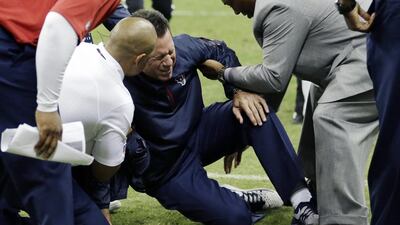Denver’s John Fox already was settled in a hospital bed elsewhere, having required heart-valve replacement surgery after feeling dizzy the day before.
The gruelling season is taking its toll not only on players. Last Sunday, the Houston coach Gary Kubiak collapsed on the field at half time and was ferried to a hospital, where doctors determined he suffered a “warning stroke” caused by a temporary blood clot.
And so, over one weekend, two of the 32 coaches landed on what amounts to their injured reserve list. Kubiak has targeted next weekend for his return; Fox’s is uncertain.
On the sports spectrum, football might not rise to the most stressful for coaches, but it demands the most time. Player instruction and game planning eats up more hours than in baseball, basketball or hockey, all of which are more spontaneous by nature.
Only football coaches are notorious for sleeping overnight on office couches to save the precious minutes of commuting so they can spend more time watching game film or sketching X’s and O’s.
With so much data and video available, a coach could toil 24/7 between games and not process all relevant information.
Those who arrive home nightly for dinner might salvage a small degree of the healthy lifestyle, but gnawing away at them is the realisation that an adversary burning the midnight oil is gaining an edge.
Extend some sympathy to the guys in the headsets, too.
sports@thenational.ae
Follow us on twitter at @SprtNationalUAE

